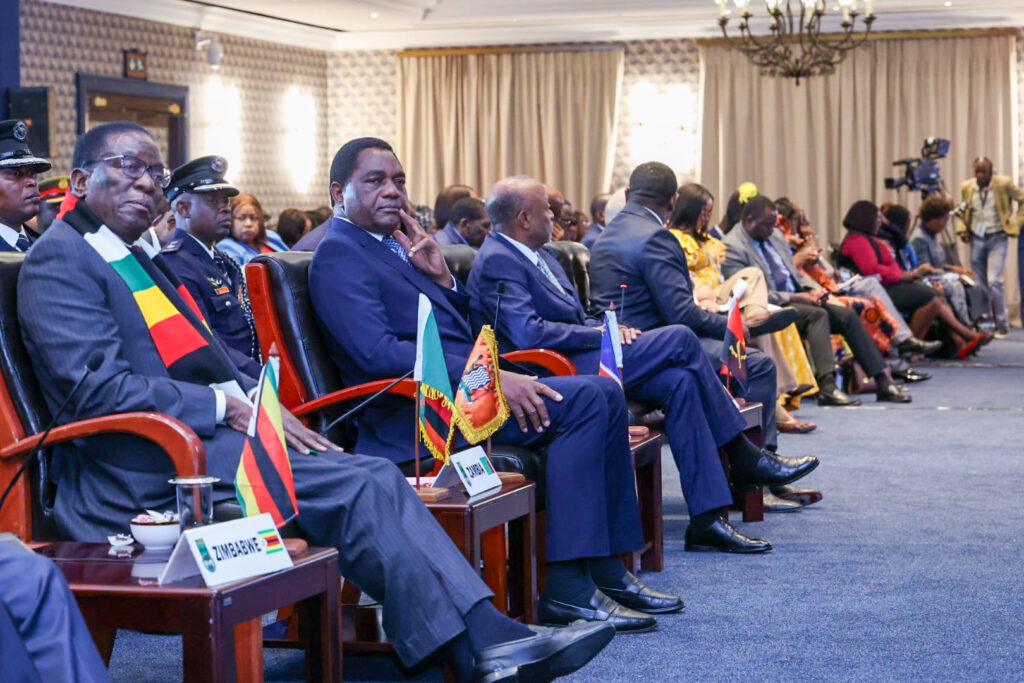
By Pamela Kapekele in Livingstone
Correction: Dr. Nyambe Nyambe, the Executive Director of the Kavango-Zambezi Transfrontier Conservation Area (KAZA), responded to our recent story titled “KAZA Heads of State Summit Labeled Talk Shop,” expressing concerns about factual errors. He provided corrections regarding the geographical extent of Zambia within KAZA and clarified the context of President Mwanawasa’s involvement. We have duly noted and amended our story accordingly.
Additionally, Dr. Nyambe expressed dissatisfaction with Kelvin Chihilwa’s comments about the recently-held KAZA heads of state summit in Livingstone.
In light of Dr. Nyambe’s input, we extend our gratitude for his valuable insights and strive for accuracy in our reporting.
Despite the pledges and action points made at the inaugural Kavango-Zambezi Transfrontier Conservation Area (KAZA TFCA) Heads of State Summit in Livingstone on May 31st, which was attended by leaders from the five member countries, Kelvin Chihilwa, a young tour operator and environmentalist, described the summit as “all talk and no action.
Zambian President Hakainde Hichilema hosted the inaugural KAZA Heads of State Summit in Livingstone on May 31st, attended by leaders from the other four KAZA countries – Namibian President Dr. Nangolo Mbumba, Zimbabwean President Dr. Emmerson Dambudzo Mnangagwa, Botswana Vice President Slumber Tsogwane, and Angolan Minister of Tourism, Marcio de Jesus Lopes.
The summit centered on key discussions regarding conservation, border management, and human-wildlife conflict.
Before the summit, various stakeholders, including Chihilwa, participated in discussions. However, he concluded that the KAZA initiative has become a “talk shop” with minimal tangible results. He told MakanDay that the entire KAZA endeavor heavily relies on support from American, German, WWF, and Irish sources.
“If it were solely up to our governments, KAZA might not exist. Even local communities are often unaware of this initiative, yet their involvement is crucial for KAZA’s success,” he said. “Moreover, our governments often exhibit double standards. For example, Zambia has permitted lodges and hotels within protected areas like Mosi-oa-Tunya National Park, against the advice of environmentalists and ZEMA. Similarly, Zimbabwe is developing Batoka City near Victoria Falls, posing risks to the environment and wildlife. We must practice what we preach.”
During the summit, Hichilema proposed an innovative “non-stop border posts” initiative, leveraging technology to combat corruption and streamline movement across the KAZA territory. Emphasizing the significant potential for tourism and regional integration, he stressed the importance of seamless travel among Angola, Botswana, Namibia, Zambia, and Zimbabwe.
Conservation emerged as a central theme throughout the summit. Hichilema and SADC Executive Secretary Elias Magosi underscored the critical need to protect KAZA’s natural heritage and wildlife.
Hichilema’s plea for an end to poaching and collaborative efforts to address climate change highlighted the urgency of these issues.
While praising KAZA as a model for future Transfrontier Conservation Areas, Magosi urged member states to prioritize both wildlife preservation and human safety, addressing the persistent challenge of human-animal conflict.
Dr. Nyambe Nyambe, Executive Director of KAZA, celebrated the summit as a significant milestone, signaling a promising era of cooperation and achievement for the initiative.
Zambian Tourism Minister Rodney Sikumba, chair of the KAZA Ministers’ Council, echoed this optimism, emphasizing the need for collective action to tackle human-wildlife conflict and unlock KAZA’s full potential.
The summit concluded with a communiqué outlining nine recommended action points, which included expediting the operationalization of the SADC CITES Engagement Strategy 2022-2026. This strategy aims to defend the region’s conservation, promote sustainable use, and support socio-economic development interests at CITES CoP 20 in Geneva in 2025.
Additionally, the communiqué detailed plans for harmonizing wildlife ownership models, establishing legal policy frameworks for carbon credit trading, and enhancing forestry management by 2030 in accordance with the SADC Regional Indicative Strategic Development Plan (RISDP 2020-2030). It also proposed a ban on raw timber exports within KAZA.
Furthermore, the summit underscored the urgent need for approval of the KAZA TFCA Livelihoods Diversification Strategy and Climate Change Livelihood Focused Risk Assessment Strategy. Botswana committed to providing land for the construction of the KAZA Secretariat near the Kazungula border in Kasane.
Background
Established in 2006, the KAZA TFCA was conceived by the political leadership of Southern Africa at the time to implement the SADC Wildlife protocol. Tourism and environment ministers from Angola, Botswana, Namibia, Zambia, and Zimbabwe signed an agreement to jointly manage the 520,000 km² area—larger than Germany and Austria combined and nearly twice the size of the United Kingdom.
The KAZA TFCA’s mission is to sustainably manage the Kavango-Zambezi ecosystems, its heritage, and cultural resources based on best conservation and tourism models through harmonized policies, strategies, and practices.
The KAZA TFCA covers national parks, game reserves, forest reserves, conservancies, game/wildlife management areas, and communal lands, and is home to 2.5 million people. In Zambia, KAZA stretches from the north of Kafue National Park, covering the entire park and Game Management Areas.
On August 18th, 2011, the five countries upgraded KAZA TFCA by signing a treaty to ensure the prudent conservation and management of their shared natural resources for present and future generations within the context of sustainable development.
Discover more from MAKANDAY
Subscribe to get the latest posts sent to your email.